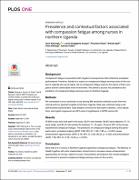Prevalence and contextual factors associated with compassion fatigue among nurses in northern Uganda

View/
Date
2021Author
Kabunga, Amir,Lucas Goodgame,Ponsiano,Brenda, Viola,Samson Anyayo,Okalo,Apili,Nalwoga,Udho
Metadata
Show full item recordAbstract
Background
Compassion fatigue is associated with negative consequences that undermine workplace
performance. However, literature is scarce on compassion fatigue among nurses in the context
of Uganda who are at higher risk of compassion fatigue owed to the nature of their occupation
and the unfavorable work environment. We aimed to assess the prevalence and
predictors of compassion fatigue among nurses in Northern Uganda.
Methods
We conducted a cross-sectional survey among 395 randomly selected nurses from two
referral and four general hospitals in Northern Uganda. Data was collected using a selfadministered
questionnaire. Data analysis consisted of descriptive statistics, cross-tabulations,
and logistic regression at a 95% level of significance in SPSS version 25.
Results
Of 395 nurses who took part in the study, 58.2% were female, 39.8% had a diploma, 47.1%
were single, and 32.4% had worked for between 11–15 years. Close to 50% of the nurses
experienced compassion fatigue. The predictors of compassion fatigue among the participants
were; workplace bullying (AOR: 3.83; 95% CI: 1.99–7.36; p = <0.001) career
enhancement opportunities (AOR: 9.16; 95% CI: 2.32–36.22; p = 0.002; and remuneration
(AOR: 7.30; 95% CI: 2.73–19.49; p = <0.001).
Conclusion
More than 3 in 4 nurses in Northern Uganda experience compassion fatigue. The Ministry of
Health together with other stakeholders should strive to increase career enhancement
opportunities for nurses, improve nurses’ remuneration and improve the overall workplace
environment to prevent compassion fatigue among nurses in the country.
Collections
- Research Articles [54]
